Chengdu 2023: A Bittersweet Symphony of a Worldcon

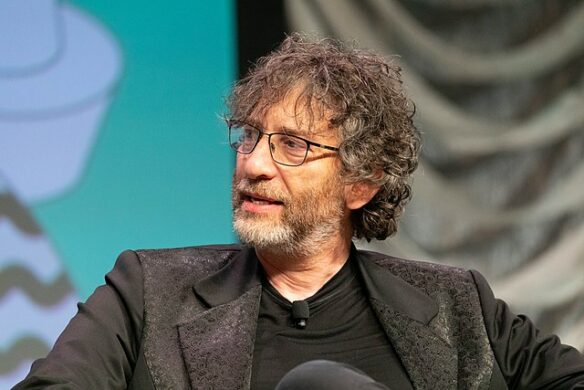

I’ll take you down the only road I’ve ever been down
Been down
Ever been down
Ever been down
Ever been down
Ever been down
Have you ever been down?
Have you ever been down?
Have you ever been down?
++ “Bittersweet Symphony” by Richard Ashcroft of The Verve, with Mick Jagger and Keith Richards
By Chris M. Barkley: January 20th, 2024: A Day that will live in Fannish Infamy.
What was that day like? It was like racing down the stairs on Christmas Day and spotting a large package containing the LARGEST chocolate bar you have ever seen, ripping the wrapping and packaging unheeded and sinking your teeth into it for a BIG bite…only to find out an instant later and much to your horror, that your dear, elderly, nearsighted grandparents had bought a gigantic bar of bitter, very untasty, dark baking chocolate.
Yes, THAT kind of day. And every single day since then…
My partner Juli and I were taking a midmorning break after a panel and a late breakfast in our hotel room last Saturday at the 49th edition of the ConFusion sf convention in Novi, Michigan, when she noticed a Facebook post from a well known Chicago area sf fan, Dave McCarty:
· January 20 at 11:48 am
“For those following at home, the release is out.”
As many of you may now know, Mr. McCarty was one of the lead Hugo Award Administrators for the 81st World Science Fiction convention that took place in the People’s Republic of China’s fourth largest city, Chengdu. It also happens to be the capital of China’s sff community.
We, along with a lot of people in the fannish community, had been eagerly awaiting the release of the 2023 Hugo Awards Long List of Nominations.
You may also be aware that I attended the convention, too; not only in the capacity of File 770’s foreign correspondent, but as a Hugo Award Finalist in the Best Fan Writer Category.
During my stay I did not encounter any problems with anyone on the Convention Committee, congoing staff or fans, or any of the police or security services who were (heavily) present. I, in turn, was very polite and circumspect in my behavior and attitude while I was there, since I considered myself as a diplomat for my country AND for the international fannish community as well.
Full Disclosure: I was an invited guest of the Chengdu World Science Fiction Committee and the host fan group, the Chengdu Science Fiction Society. I did so of my own free will, knowing that the People’s Republic of China is a totalitarian regime with a very vigorous system of surveillance and social intimidation. I went to Chengdu, with airfare and expenses paid, without any prior restraints on what I could say, do or go. I went because:
(a) I was invited by the hosts of the convention and I wanted to represent the sf community on a world stage.
(b) I was a Hugo Award nominee for fan writing and, most importantly —
(c) I am 67 freaking years old and exactly WHEN THE HELL was I going to get another chance to visit Asia, much less the People’s Republic of China?
So, I went all in, with my eyes, and ears wide open. I was on the lookout for anything unusual. I even took a “dumb phone” which had a very limited connectivity and functions just in case the Chinese security services became a little too interested in me. (This rather foolish and overly paranoiac move actually caused more problems than it actually solved.
(Note: I am currently at work transcribing a diary I kept during the period of my nomination and my stay at the convention where this blunder and other fascinating things will be revealed. It will be published on File770 later this year.)
Onward…
[Chris Barkley’s column continues after the jump.]
Until very recently, the Hugo Award voting statistics were made public immediately after the Ceremony itself. In 2022, while I was the head of the Press Relations team at Chicon 8, I received word that from Seanan Maguire that the release of the final vote and long list was a problem for her, other nominees and Hugo Award recipients because fans would approach in person (or online) with inane comments like “I voted for you” and “You were robbed” and, most damningly, “You lost by so-many votes”.
Having witnessed such callous and insensitive activity at previous Worldcons, I sent a message to the Hugo Award administrators on site outlining the problem and pleaded with them to put a 24-48 hour hold on disseminating that data for the sake of everyone involved. Thankfully, they complied.
In the frenzied aftermath of the Chengdu Hugo Awards Ceremony I was rather hoping that the trend of holding back the voting statistics would continue. Little did I know at the time that’s exactly what was going to happen.
In spades.
So, at the time, I was very relieved when the statistics were not released right away. But for several weeks afterwards, I, and a great many other fans both here and abroad, began to wonder when that was going to happen.
On December 2nd Hugo Award Administrator Dave McCarty, who was attending an annual convention runner’s meeting in Providence, Rhode Island, posted the following on his Facebook page:
My “next” public announcement (revising a statement I just made an hour ago on a panel about the Chengdu Worldcon that was held this morning):
The Hugo voting stats have been on a long and winding journey, but that journey is at an end. They have been reviewed at multiple levels by our team and all the things we could find that needed correction have been resolved.
The usual bugaboos like typos in the summation formulas have been joined with items like “this is a valid translation of that phrase, but it’s not the right one for this purpose” (which happened a bunch of places) and “this font is meant for Japan and while readable, won’t look appropriate to fans in China” (which was a hard one to get rid of because I kept misunderstanding the feedback).
But, we think they’re as correct as we can make them.
The reviews finished too late “today” in China. The website folks are already asleep.
They should have the results up on the website by noon “tomorrow” (a bit more than 12 hours from now) and at that point there should be social media announcements and I will push the PDF to TheHugoAwards.org and a few other places like Locus and file770.
The last page of the PDF says roughly what I’m about to say here:
The nomination stats are not out yet. We will definitely have them out before the deadline of 90 days post convention, but right now “No, I don’t have an expected release date”
Again, folks connected with me are free to spread this post wherever they think appropriate.
And the very next day, they were: https://www.thehugoawards.org/wp-content/uploads/2023/12/2023-Hugo-Awards-Stats.pdf
Of particular interest to me were the results of the Best Fan Writer race:
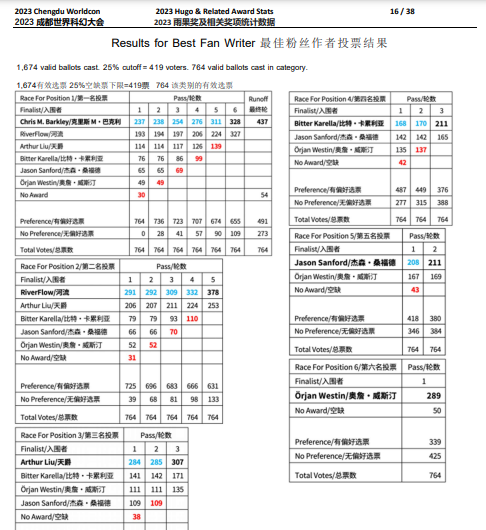
I admit that I am not an expert of ranked choice voting, but it sure looked to me as though I led throughout all six rounds of voting. And in that last column, number six…there’s a separation of one vote.
It was my partner, Juli, who knows many more things about ranked choice voting than I do, gently informed me that I had won BY JUST ONE VOTE!
Well, that little factoid shook me to my core! Had I found this out while I was still in China I guarantee you that I would have freaked out on the spot!
Shortly thereafter that day, I received many messages through social media congratulating me on winning what was being called THE closest race in the history of the Hugo Awards. BUT, that wasn’t QUITE as true as I thought it might be…
Just out of curiosity, I did a little research on this and I have found only one other instance of a one-vote victory taking place during the modern, ranked voting era of the Hugo Awards (since 1998). Which, interestingly enough, was also in the Best Fan Writer Category in 2007:
First place
Dave Langford: 80/80/88/103/128
John Scalzi: 87/88/92/102/127
John Hertz: 60/60/72/80
Steven H Silver: 37/37/42
Chris Garcia: 32/32
No Award: 25
End of digression, onward.
After looking through all of the other categories, I found a curious announcement on the very last page (in English and in Mandarin):
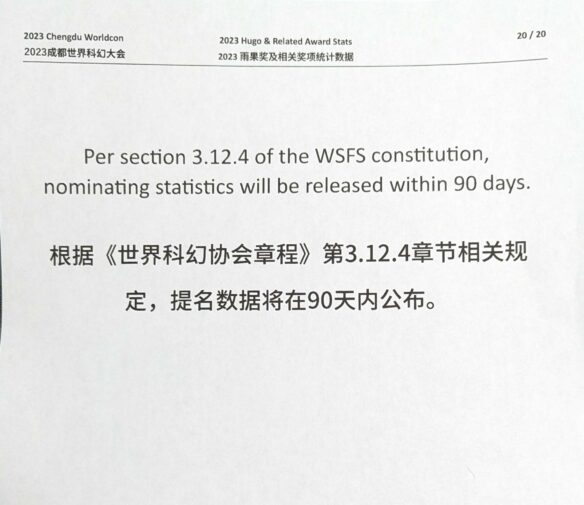
My thought at the time was that this was a very peculiar thing to post; why would there be a delay? If the final tally had already been completed, what was the holdup in releasing the Long List of nominations?
As December lapped into January, it became apparent to me (and everyone else) that the release was being deliberately held back until the last possible day, Friday, January 19th.
Later that same morning, Juli and I traveled north to attend ConFusion, one of Michigan’s oldest annual sf conventions. I was their Fan Guest of Honor last year and this year it was my honor to introduce this year’s Fan Guest, the renowned fan writer and cartoonist Kurt Erichsen.
By the end of the day here in the US Eastern Time Zone, there was no announcement of voting results.
Shortly before noon, the Long List went up. But Mr. McCarty failed to mention where it was available, so I shot him a quick dm asking where? He quickly replied it was on the Hugo Awards website.
The site had a repeat of the Final Ballot results, followed by the Long List.
And THAT, dear readers, is where the anti-matter really hit the shitfan…
On the very first page, I was gobsmacked by the exclusion of R.L. Kuang’s Nebula And Locus Magazine award winning novel, Babel!
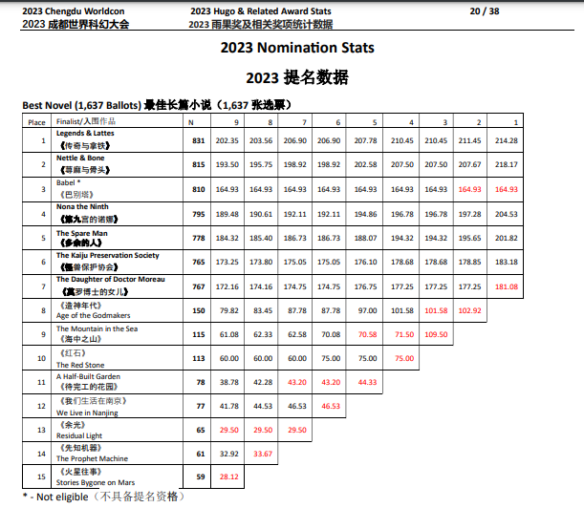
My shock quickly continued when I noted the ineligible status of the novelette “Color The World” by Congyun “Mu Ming” Gu and the short story “Fongong Temple Pagoda” by Hai Ya without any explanation. It was subsequently revealed that Gu’s story was first published in 2019. Ya’s exclusion remains unexplained.
Besides Babel’s egregious banishment, the other big ‘ineligibles” were:
- The absence of the Neil Gaiman produced series The Sandman and Episode Six, “The Sound of Her Wings”
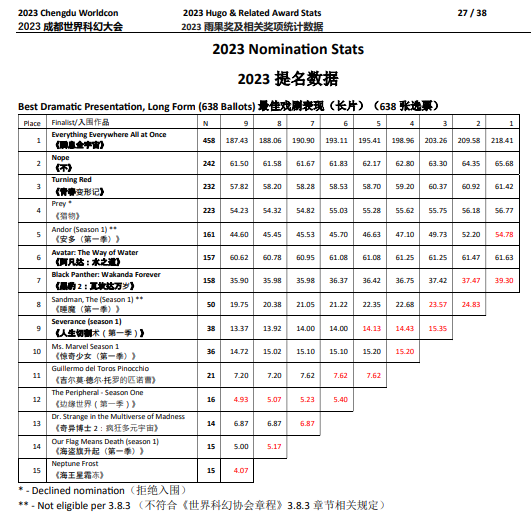
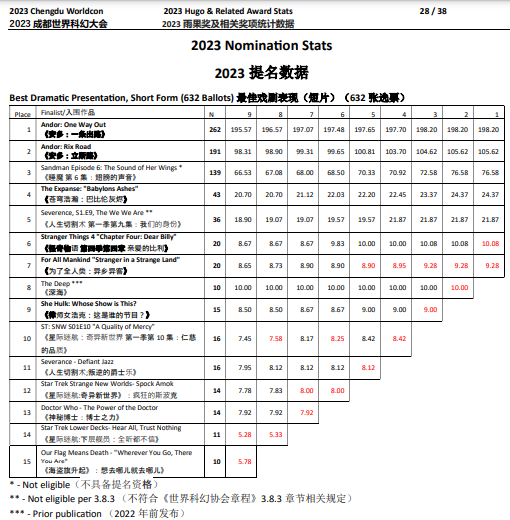
- Paul Weimer being excised from the Best Fan Writer category
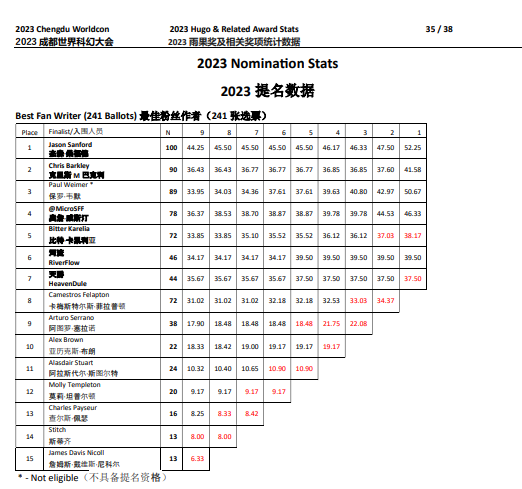
- Xiran Jay Zhao being declared “not eligible” on the Astounding Award Final Ballot
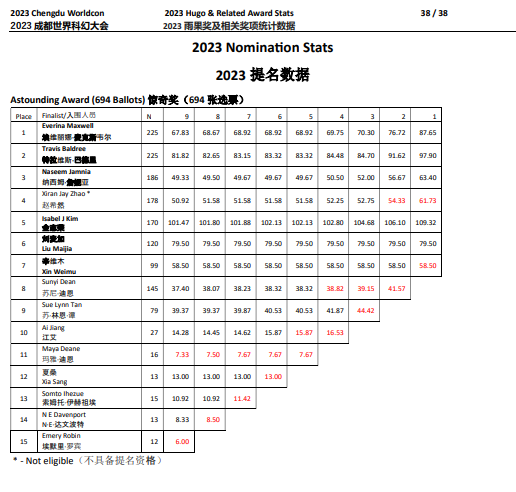
All of this almost made me physically ill.
Meanwhile, news of the Long List controversy spread like an out of control wildfire among the ConFusion attendees. As I went to panels and wandered the hotel, several people went out of their way to come up and to assure me that my winning this year was worthy and well deserved.
While I found these kind gestures reassuring, the feelings of guilt and helplessness haunted me on the long drive home Sunday evening.
Following the announcement, I have been beset with daily bouts of insomnia, emotional mood swings, restlessness, acid reflux and random headaches.
Almost immediately, there was widespread condemnation of the Chengdu Convention Committee and the Hugo Award Administrators who oversaw the voting. Fans, writers, artists and editors, here and all over the rest of the world (including in the PRC as well) have universally hailed that the release was not only damaging to the nominees and winners, it had cast severe doubts on the reputation AND the future of the Hugo Awards.
As one of the winners of this year’s awards, I felt I had a personal responsibility to spread the news of the growing debacle and to openly comment where I could online against what seemed to be an attempt to stifle the expression of opinions and free speech.
As I posted my outrage on social media, it was pointed out to me by several people that what may have happened may not have been a direct attempt to censor by the Chinese Communist Party, but a move to “self censor” by entities either inside or adjacent to the convention to avoid any direct measures from the government. I was also pointed in the direction of this vital essay by sf author and educator, Ada Palmer, “Tools For Thinking About Censorship”.
If Ms. Palmer’s assertions were put to the test in this particular case, it might explain the evasive answers given by Hugo Administrator Dave McCarty and the pointed lack of response from the Chengdu convention runners. But, with no witnesses coming forward or any other concrete evidence of malfeasance other than the cold equations of the Long List, everyone was speculating about what really happened.
I note that I saw some ominous comments online in the past few days; that “throwing someone under the bus may have a FAR different and more serious meaning in other countries, especially authoritarian ones, than it would be here in the United States or in other democracies.”
When it comes to matters involving freedom of expression or, as we usually refer to “free speech”, we Americans (in particular) take an almost offensively chauvinistic pride of our First Amendment rights granted through our US Constitution as a fundamental part of our open society. People who live in less democratic circumstances, like Russia, North Korea, Turkey or, in this case, the People’s Republic of China, tend to be very reticent about telling others exactly what’s on their mind.
I heard an appropriate Chinese aphorism at a dinner one evening while I was in Chengdu; “We say little. But we see all.”
So it was quite telling when a BlueSky user named Angie Wang posted some very virulent criticisms of the Chengdu conrunners by La Zi a Vice-Chair of the convention on January 23rd:
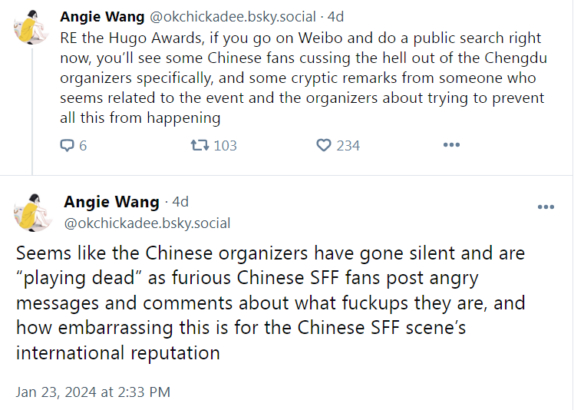
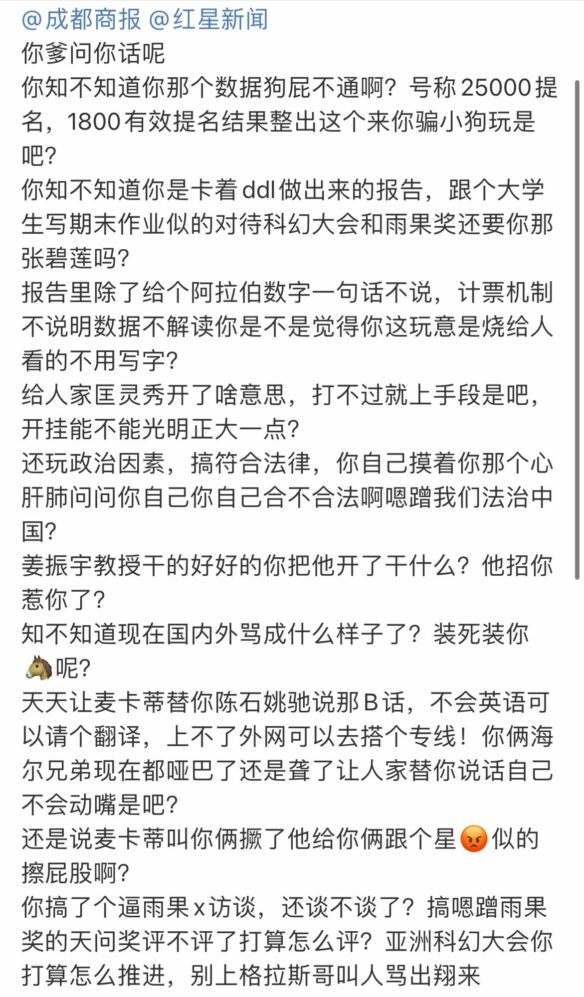
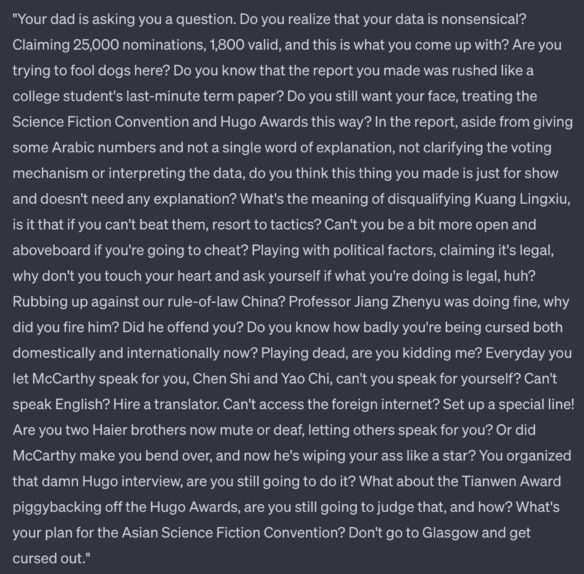
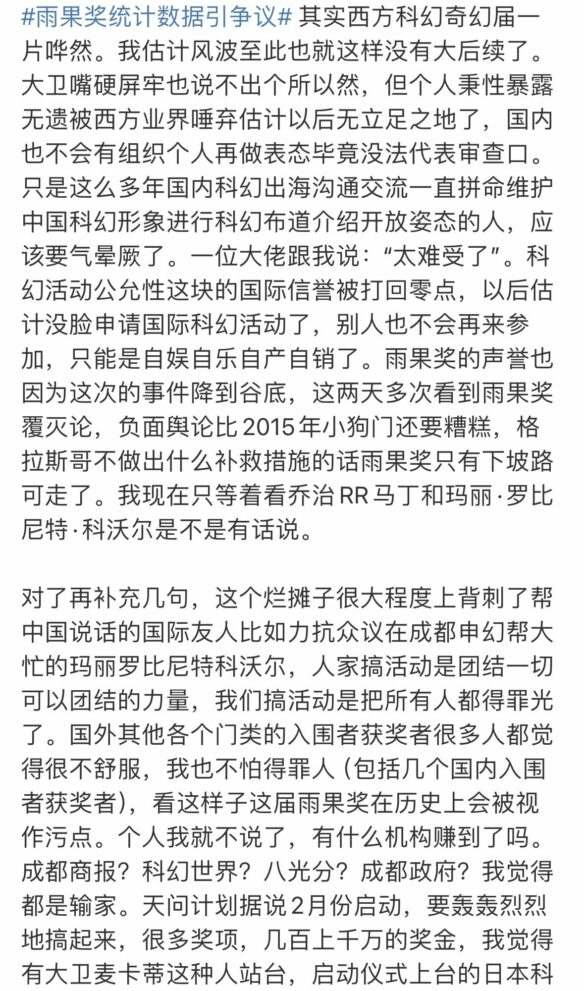
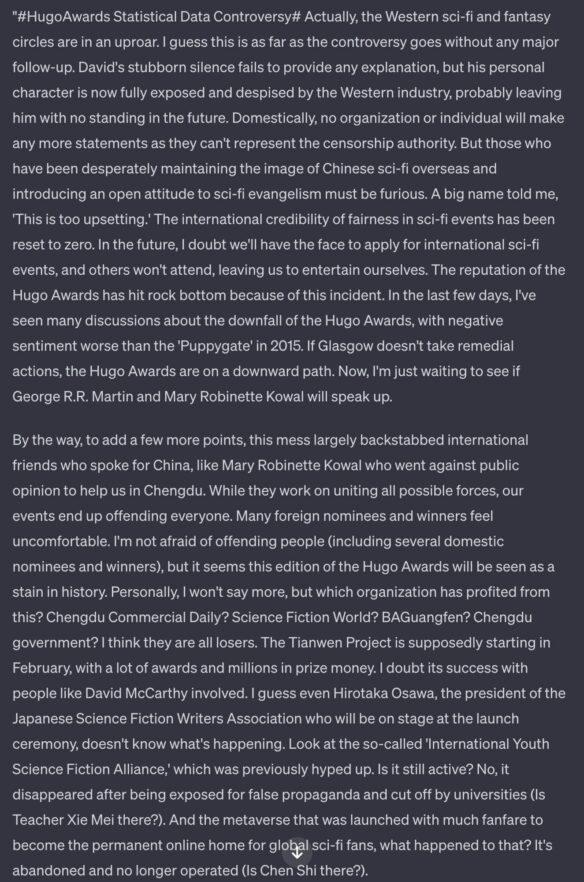
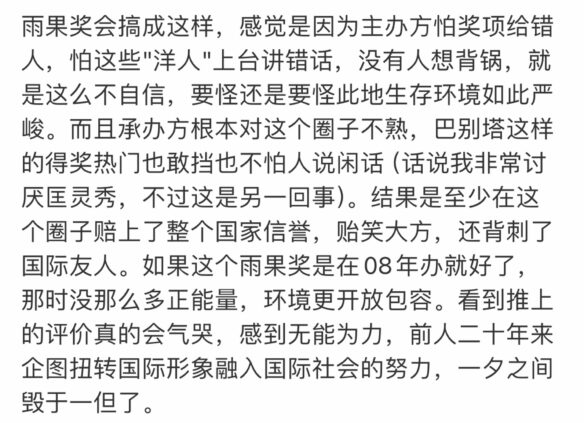
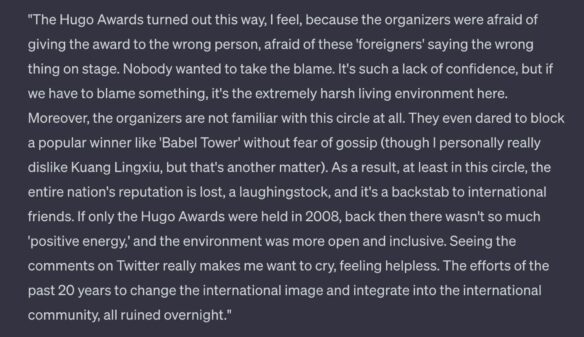


These Google Translated excerpts are particularly remarkable and damning considering who was saying them.
La Zi has placed themselves at great risk for expressing their displeasure at what may have been perceived as a corruption somewhere in the nominating process, and thereby affecting the Final Ballot lineup.
And if this is the tip of the iceberg of scorn fermenting in the PRC, I can only imagine how badly this fiasco is going down among the rest of the sff fans there. I have no doubt whatsoever that many of them fear that this will not only reflect very badly on Chinese fandom, but their chances of ever hosting a Worldcon again in the very near future have been greatly diminished as well.
I had gone to China naively hoping that something like this wouldn’t occur. A nation that has been insistent in stating that it is an innovative and prosperous society and an emerging world power, did not need to interfere, either directly or indirectly, in a prestigious literary event that they helped finance and widely promoted.
And while I am reluctant to comment on the Best Novel, Best Dramatic Presentation and Astounding Award for Best New Writer categories, I am willing to venture a few comments on the Best Fan Writer category.
As many of you know, I was also nominated in the same category at the 2022 Worldcon, Chicon 8. That convention’s Hugo was awarded to Cora Buhlert of Germany while I placed fifth on the ballot. My fellow nominee Paul Weimer, finished in third place.
I have said in my Chengdu acceptance speech that I considered Mr. Weimer and all of my fellow nominees as being my peers, not rivals. I also said that I would have been happy if anyone else in this category had won instead of me. Except this time it was me and I am eternally grateful to have won.

But, as you can see in the chart above, Mr. Weimer, who had been a nominee at the previous three Worldcons, is marked “ineligible” with no explanation attached. I have a theory as to why that may have happened:
After the selection of the Chengdu bid in December 2021, Mr. Weimer was one of the vocal dissenters of PRC holding a Worldcon, citing the government’s authoritarian practices inside the country and other concerns about their record on human rights domestically and in the region.
Using the nomination chart as circumstantial evidence, I am quite certain in theorizing that among the top four nominees on the Long Nomination List, it was Mr. Weimer who was the most vocal critic of the PRC among us. And that he was clearly targeted.
Please note that before Mr. Weimer was erased from the ballot, all of the fan writers were from the West, save one, RiverFlow, who is Chinese. After Mr. Weimer declared “ineligible”, the next nominee down the list, HeavenDuke (which is the pen name of Arthur Liu) was promoted to the Final Ballot.
I have read HeavenDuke’s work and I found it incredibly worthy of a Hugo Award. I DO NOT blame HeavenDuke for this unfortunate happenstance since he, I and all of the other finalists are probably feeling a great deal of unease at the prospect of anyone putting their finger on the scale to diminish Paul Weimer to the advantage of someone else in the category.
But here’s an interesting piece of speculation; what if HeavenDuke’s presence on the ballot inadvertently cost RiverFlow a Hugo Award?
As you can see from the distribution of votes, I received a majority of the votes in each of the six rounds, but each time the votes were distributed, RiverFlow gained votes. It’s interesting to note that it seems RiverFlow and HeavenDuke split a number of votes through each succeeding round. Had RiverFlow been the sole Chinese nominee, he might have been an overwhelming winner that evening and could have taken home two Hugos instead of the the sole award he shared with his co-editor, Ling Shizhen, for Best Fanzine.
Or, conversely, could Paul Weimer have won on his own?
We’ll never really know for sure.
Obviously, there are a lot of suggestions on how we can prevent this travesty from ever happening again. I have a few ideas of my own:
- The administration of the Hugo Awards must be completely severed from the control or influence of the individual Worldcon convention committees or any governmental, judicial, legislative or law enforcement bodies of the hosting country.
This means that the Constitution of the World Science Fiction Society must be amended to split off the awards from each annual convention in favor of a non-profit organization with a rotating series of administrative volunteers who will handle the nomination and voting results. An organizational model such as the National Book Awards, the Newberry Awards or the Pulitzer Prizes should be considered. Under this separation from the convention, the Hugo Awards will retain their trademark and, if necessary, distribute the awards independently of the Worldcon.
- There has been a considerable amount of consternation from some western fans that the Worldcon should never have been held in the People’s Republic of China in the first place, citing their various human rights violations and hostile geo-political intentions. Several weeks ago, the Editor Emeritus of Amazing Stories published an editorial outlining his concerns about upcoming bids from Uganda, Saudi Arabia and the prospect of countries like Russia, Belarus, Hungary or other totalitarian regimes, who could legally bid for a Worldcon: “The Fannish Inquisition Needs More Than Soft Cushions and Comfy Chairs”.
Mr. Davidson urged sf fans, who vote on Worldcon Site Selection every year, not only to be more aware about which countries were bidding, but demand that harder, sharper question be asked during the bidding process saying:
We, Fandom, have to develop some standards for the awarding of that opportunity. We’ve got to step up and recognize that there are more things in play than just our desire to hang out in a country we’ve not been to before.
In conclusion, Davidson wrote:
Countries wanting a Worldcon to help advance their own agendas on that stage gives Worldcon leverage. Leverage that it can use to support and advance its own cause. Let’s not blow it.
I have an even better idea; instead of admonishing fans to do better voting-wise, I have a few more radical solutions that fans, con runners and bidders, cannot ignore.
The next successive WSFS Business Meetings should incorporate the United Nations Universal Declaration of Human Rights into the Site Selection portion of WSFS Constitution.
In case you are unaware of this historic 1948 document, here’s a refresher.
In his forward to this version of the document, former UN Secretary Ban Ki-moon (who served from 2007-2016) wrote:
The commitment of the United Nations to human rights stems from the Organization’s founding Charter. The international community has a duty to uphold and defend these rights. Let us ensure that those people who most need their rights protected are made aware that this Declaration exists — and that it exists for them. Let us each do our part to make these universal rights a living reality for every man, woman and child, everywhere.
With the adoption of these principles codified in the WSFS Constitution, sf fandom will be sending an unambiguous message that we take being the guardian of human rights very seriously.
Also, the WSFS Constitution should be amended to require that any Worldcon bid sign a legally notarized statement, stating that their bid and subsequent Worldcon will abide, to the letter, every provision of the Universal Declaration of Human Rights. And if ANY bid refuses to sign and submit such a document, the bid will be disallowed. Any bid that wins and fails to live up to the standards of the Declaration, through their actions or inactions against outside influences, the bidders from that country will be permanently banned from bidding for a future Worldcon.
- In addition, another legally binding provision should be added; that ANY country that attempts to, or does interfere in the function of a Worldcon, the convention committee, staff or their attendees, that country will be permanently banned from hosting a Worldcon.
- Some sort of compensation should be offered to all of the people who were declared “ineligible” on the 2023 Hugo Awards Ballot. I have no idea what sort of offering that the Glasgow (or Seattle) Worldcons can bestow but I hope someone, somewhere, with a higher pay grade and bit more imagination than yours truly, will come up with a graceful and appropriate idea.
When I traveled to Chengdu, I didn’t go as an American or a westerner who loved sff. I went as a representative of the wider world of fandom.
There has been some loose talk about asking (or pressuring) the winners in the affected categories to consider “returning” their awards.
Return them? To whom? The Convention Committee? The Hugo Award Administrators? The nearest consulate of the People’s Republic of China?
I have a question for anyone who wants that to happen; have you seen this Hugo Award?
I will treasure its presence in our home for as long as I live.
After I first held this award in my hands for the first time on the stage of the Hugo Awards Ceremony, I remarked in my acceptance speech how lucky and grateful I was to be bestowed with such a beautiful and magnificent piece of sculpture that was appropriately symbolic of the science fiction and fantasy community and of the culture of the host country as well.
To me, it was very reminiscent of the 2007 Hugo Award design by Takashi Kinoshita, which incorporated Japan’s Mount Fuji, the rocket and the imposing figure of their national tokusatsu hero, Ultraman.
Here’s the point I want to make; I take being the recipient of this Hugo Award, even under these rather trying circumstances, very seriously. To me, it’s more an achievement in fandom or the symbolic of honoring my fan writing in a given year.
I am fully aware that people may regard this set of Hugo Awards as being either not very desirable or tainted because of what happened with the release of the Long List of nominations on January 20th.
You may do as you like, but I am defining this award for myself and my family and friends.
To me, it is the dream of a lifetime; a shining totem that I will eventually pass on to my daughter Laura and then on to her daughter, Navia.
It is my tiny little mark in the library of literary history.
That I did something. And I will be remembered, even in this small way.
That’s all I ever wanted from my participation in fandom.
And it’s enough.
Discover more from File 770
Subscribe to get the latest posts to your email.

Clickity
@Chris,
“People who live in less democratic circumstances, like Russia, North Korea, Turkey or, in this case, the People’s Republic of China, tend to be very reticent about telling others exactly what’s on their mind. ”
Just a point of reference, this is true in Chinese culture in general. Body language, and saving face etiquette are used
So…you acknowledge that the votes have been fiddled with, not one but two people could well have won instead of you, the process has been hopelessly comprised pandering to a regime that is running literal concentration camps,and you’re keeping the award… Because you want it?
It’s seems facile, but many Americans are up in arms because their former president claimed to win an election because he “defined it for himself”.
It seems the height of moral cowardice to ignore the multiples issues with this and keep the award simply because you want it. I’m sure the other nominees wanted it, too.
You should treasure your win, Chris, no matter what happened in the category. We will indeed never know who would have won had I been on the ballot, its a thought exercise not worth the time to try and figure out.
We can and must do better going forward.
As far as me being a critic, the sheer inconsistency of this is the frustrating part. Out of the fan writers, perhaps, but there are nominees far far far more vocal about China than me who were untouched.
And as I have said elsewhere, I do want, and need an explanation. Was this entirely the doing of Chengdu and in their mind (ie Palmer’s soft censorship?) Or was it hard censorship, and I really did run afoul of Chinese laws? The lack of transparency is frustrating.
Heavy sigh. And you thought the adventure was over when you stepped onto the plane to leave China?
A very peculiar rabbi of my fond acquaintance once told me that one of the reasons he loves fandom is that it feels just like home. So incredibly Jewish. A large bunch of very-smart-but-very nerdy friends and fellows gather in tight circles endlessly debating nits, arguing over the numbers, and squabbling, backbiting, and feuding – and yet never consider separating because they are family.
Thank you for going to China for us, Chris. And now you’re home, let it pass. Don’t worry about the possible injustices or the complicated nest of numbers. You won, and we’re hugely proud of you. As for the rest. it’s done, in the past. You can’t bring Kennedy back.
Pingback: AMAZING NEWS FROM FANDOM: January 28, 2024 - Amazing Stories
Among the 4 translated paragraphs, only the last one was from Lazi. the 2nd one was posted by me. FYI.
While I am a strong advocate for all nations to adhere to the Universal Declaration of Human Rights, are people aware that the US itself is notably in violation of many of those precepts?
Additionally while I have sympathy for Seanan McGuire’s plea, there is a magic and a safeguard to the insistence that the numbers be released (by tradition) on the night of the awards, so that all gathered may pore over the numbers AND FEEL REASSURED FOR THEIR VALIDITY and rewarded for their participation. The release of the numbers that night is not for the sole impact on the winners or the nominees who “missed it by that much”, nor even for those who can now be revealed to have just missed nomination. It is specifically, in impact, about a safeguard for events very much like what has unfolded this year, so that the gathered crowd of interested members of the Worldcon can participate in the most geeky of award activities, of explaining or having explained to them the intricacies of the process…and getting reassurance of transparency.
Leaving open that “you can release it on the 90th day” loophole is a significant aid to this kind of questionable non-transparency.
I am not unmindful of the additional pressure this puts on the Hugo administration team, but this is a thing we have managed for many years past, and even with the added complexity of the processes involved in EPH.
The thing that I have not yet examined, because I have always taken this tradition (of releasing the numbers) for granted, is when it started, and also how it was handled at Worldcons where the predominant language of members was something other than English — how did we handle it in Japan, or Finland?
I understand that “well this had to be handled in Chinese” was a challenge, but…it should have been handled as of time of award anyway, because these things needed to be explained to the voters, and so this work should already have been finished by the time of the awarding. I would like to see the “night of” numbers release reinstated (by custom, not by constitutional requirement) at Glasgow and going forward.
KTO: To answer that question– the release of the Hugo voting statistics per se became a requirement in 1980 following the 2-year passage process. The first time they were distributed at the Worldcon was much later — I will have to look it up. I can visualize the occasion but at the moment can’t place the year.
I wasn’t at Nippon 2007 or Helsinki. Hopefully others will remember
I see that the Hugo administrator, according to the Nippon 2007 site, was Joyce Hooper, whom I do not know personally.
As I recall, we had nomination stats the night of the Hugo Award Ceremony in Finland.
@KTO: In addition, for Helsinki, within one day after releasing the voting and nomination statistics, the 2017 Hugo administrators posted a report of all the rules interpretation decisions they had made (in English). Mike Glyer commented in the Pixel Scroll that day,
It seems the Chinese fans are blaming corporate, not governmental, interference. I’m not sure how the corporation(s) gain, but there’s too much obfuscation for anyone outside of this mess to know what happened.
I hope we don’t have a convention again in a country that is ran like a dystopian SF universe.
@Joshua K. I am unsurprised that a country that has a strong tradition of transparency resulted in a Worldcon with unprecedented visibility of process. Hyvä Suomi
We’re being played. Outrage is being vented at a lie fabricated to misdirect us: that the Hugo team made final rulings to declare certain nominees ineligible (in accordance with, it is implied but not explicitly claimed, some sort of unspecified rules), and then ran EPH correctly on the remaining eligible nominees and calculated the winners.
It’s a lie. The EPH calculations were falsified.
Why should anyone believe a list of ineligibles was produced in good faith. For all we know they spent months tinkering, declaring different things ineligible, first before running the algorithm, then in the middle of running the algorithm until they reached a desired outcome. Or, hell, tinkering with the votes.
Dave’s apology does not preclude us asking. “The statement that the administration team has previously made about eligibility decisions is the only one I can share.” That’s correct: the WSFS Constitution contains no mandate that the administrators provide explanations for eligibility decisions.
But he better explain exactly how and why he falsified EPH.
@KTO–The release of the Hugo nomination numbers, the names of any nominees who withdrew, and the reasons for any disqualifications, has been routine for years. Usually, of course, disqualifications have been for simple and obvious reasons, like “originally published in the wrong year,” or “no eligible work in the correct year.”
Making the Hugos is, as sausage-making goes, normally quite bland. The liberal use of No Award in 2015 upset some people even outside the Puppies, but it was the voters (me included) who did that, not the Hugo subcommittee.
And the Hugo voters are a persnickety and pushy lot, who pore over the details, and ask questions when something isn’t clear. I won’t state it as an absolute fact, but I believe this is the first time actual mystery meat has been detected in the Hugos.
McCarty got the questions he claimed to find so offensive because the disqualifications weren’t explained this time.
Another use that has been made of the long list numbers: The Long List Anthology Series
Enjoy.
I can’t believe I’m bothering to respond to yet another pointless vituperative rant by Brian Z, but…
If the purpose of the flawed EPH calculations and the implausible nomination distributions had been to exclude certain targeted nominees, then why did we get a list where those nominees were shown as having the numbers but then being excluded? Instead, we would have gotten nomination statistics that showed them simply not getting the numbers to be on the ballot.
The shape of the evidence points to at least two, but probably three, independent issues. The disqualifications, the EPH calculation flaws, and the implausible distribution gaps. It is marginally possible that the last two are connected, but it isn’t my top choice as an explanation.
There are enough objective issues here that we don’t need to invent easily falsifiable ones.
You have the order the wrong way around. EPH was run and then some nominees were declared ineligible (or at least that is what is implied as happening – I don’t know what actually happened).
I agree, the EPH calculations do not look correct. However, if somebody was rigging the votes to stop Babel or Paul being finalists they did a very weird job of that! Don’t get me wrong, Babel’s stats have clear issues with them but according to the published figures the book won a finalist spot under EPH and so did Paul and the other ineligibles.
I can’t deny that the disqualification issue is drawing attention away from the deeper issue with the stats but if we assume a cover up it would be very odd to cover up a complex problem that requires spreadsheets to explain with a far simpler and more obviously egregious issue of disqualifying the novel that was the favourite to win or picking a category like Fan Writer to make an eligibility ruling on.
I’d say your theory is ridiculous except, well, every theory I’ve seen so far including my own aren’t much less ridiculous.
Chris, you have acted with honour and integrity throughout. You are clearly and demonstrably a worthy winner of a Hugo Award for Best Fan Writer. The current mess is not your fault and while others have been impacted more, all the winners of the 2023 Hugo Awards have a legitimate grievance with how things were run and the impact it has had on what should have been a happy occurrence.
Smoke:
Personally, I would rather the winners kept their awards. They won ’em. We can certainly add asterisks as we please, but since the process can’t be redone and it has been done, I would rather they have a rocket. To shame them into giving them up would just mean no one at all got any pleasure out of this year’s events, and that’s excessive. Hair shirts do no one any good.
I basically expected Chengdu to be a dubious enterprise and was not disappointed. However, anyone who got an award shouldn’t beat themselves up too much. I mostly count my blessings that the organizers didn’t run some scam that gave Sergei Lukyanenko a “Best Series” Hugo.
That said, I wouldn’t mind seeing a set of “retro” Hugos being voted on in, say, 10 years.
@ Lisa Hertel
That would be typical for a couple reasons.
First, the distinction can often be a question of translation. There’s no separation between the government and any sort of meaningful corporation in China. I’ll guarantee the heads of every publishing house worth noting have government ties and are Party members
But it’s also much safer. It’s really common in authoritarian countries to blame someone else for things the government is obviously responsible for. It lets you criticize the decision without criticizing the government
The most famous example of this is why Winnie The Pooh is banned in China. It became too obvious a stand-in
Thanks @Ryan,
Yes, “we say little, but we see all” is a description of the CCP. It doesn’t matter to them until it does. May I remind people that Jack Ma, who was the richest person in the world at that moment, criticized a government agency, and his IPO went silent the next days, and he himself had not spoken much since then.
I suspect the people doing/ordering the rigging simply didn’t care. They would do this sort of thing domestically all the time, and even if they released statistics, no one would publicly question them. The whole thing might have even been semi-last-minute as some busybody took a last look and ordered some changes.
I can almost picture the dedicated fans, both western and eastern, caught between not wanting to run a dishonest process at all, and unsuccessfully trying to convince everyone necessary that if they are going to manipulate it they actually need to put real effort in.
I wish the various strange and muffled responses were consistent. If it were just McCarty claiming it was “the rules” and then his personal decision and then apologizing, we could ascribe that to the erratic actions of one person.
But every single member of the Hugo committee and the active concom, who knows what happened, agreed to issuing a simple bland statement that added no information and to be otherwise silent. Where is Ben Yallow? Where are the others? If an entire group agrees to a statement and to silence, even after they are out of China and free of its constraints (though they may wish to return, or may have payments pending, or may have friends there under potential duress) such a unified silence is unusual in fandom. It suggests there is a larger, unifying factor which we don’t know, though many have speculated about it. It does not suggest it is the erratic or corrupt actions of one person, or even a handful of people.
In particular, the established fans like McCarty and Yallow are paying a high cost, burning their bridges to a community they dearly love. They would not do this lightly. From the outside it seems they had an obvious course: When it became apparent the awards would need to be compromised due to “local laws” they should have resigned and left. That course is so obvious, saves them so much trouble, it is puzzling why nobody took it. One can argue about why an individual might not take it, but why did nobody take it? There is a large conspiracy here — the simple conspiracy that nobody is to talk and only a simple statement be issued — and what is keeping its members loyal? What benefit is gained that is worth the price they will pay?
(This is further complicated by the fact they decided not to hide the fact that works were excluded for no explained reason, even though they must have known what a red flag that would be. Why did they decide to not try to hide that?)
@Brad Templeton–The Chinese members of the concom are still in China and aren’t leaving, because that’s their home. They’re still in danger if the foreign members of the concom say too much.
But McCarty didn’t have to be abusively nasty, and an official statement could have, without specifics, acknowledge that there were, I don’t know, something like “unavoidable differences in procedure.” And apologized up front to everyone affected.
What they can’t do is say there was censorship, because not all the committee gets to leave China.
Oh, and the fact that they published the real numbers, or something very like the real numbers, very late, after everyone on the concom that was leaving left, is because they did, in fact want us to know something happened that shouldn’t have.
They didn’t handle it well, but they weren’t intent on actually deceiving us.
Yes, this has been speculated in many messages and is a leading contender. Though it requires rather extreme pressure to use on westerners, but not impossible. And it’s strange that they were allowed to leave a letter in the nomination data saying, “Something fishy went on” and that leaving that message there didn’t violate the terms of whatever blackmail they are allegedly under.
Sure McCarty didn’t have to be nasty, in fact he said he agreed with all the others to issue only the no-information statement and otherwise be silent. He clearly got very angry and irrational and that is not hard to understand, we can always understand one person being erratic, especially under the huge amount of stress we’re talking about.
They did tell us nominees that violated Chinese rules would be removed back in July, and people made surprisingly little fuss about it. (I didn’t read it back then, if I had I would have called for much earlier plans to remediate the damage.) Perhaps that led them to think there wouldn’t be a fuss when it was spelled out in detail?
But again, no explanation is fully complete. The closest is that they are under Chinese pressure upon their friends who are back in China, but they felt that pressure would be OK if they left a clear statement in the statistics that several works were eliminated, with Chinese censorship law the most likely explanation.
That doesn’t make a lot of sense to me, but it does make some, because not everybody is rational or analytical. The conclusion is that while somebody has put pressure on them — powerful pressure — not to make China or the convention look bad, it was OK to insert the data that did just that.
Excellent column, Chris. I fully support your recommendations.
Musing on it a few minutes more, and thinking about the fact that McCarty and the committee had 6 months to think about all this, then I think a likely conclusion from your thesis that this is all driven by threats (direct or implied) on friends still in China that in fact this is all deliberate. That the committee wants to make fandom angry, and wants a big stir, as long as they can do that staying within constraints from China. In the 3-D chess model, even McCarty’s angry arguments with fans would be part of that plan.
I think that if I were in their situation back in July, I would have done all I could to resign. They didn’t, and if it’s because there was something preventing resigning, then my next plan would be to find a way to make fans angry and embarrass the Chinese evil forces while retaining safety for myself and the committee. Though the main flaw is that the bad Chinese forces generating the fear certainly aren’t going to like the bad PR for China and the convention resulting from this, but possibly for them, what matters most is that unacceptable nominees did not win, and that was achieved.
This is a conspiracy theory, and of course you should always be highly skeptical of conspiracy theories, but in this case it is well documented that there is a conspiracy, just not what its agenda is.
Brad Templeton: As to “people made surprisingly little fuss” — after Chengdu became the seated Worldcon despite many of us frequently reporting on China’s censorship activities for years, the policy wasn’t a surprise, and the public announcement wasn’t that raw (although it couldn’t mean anything else).
Also, it’s a lot easier to criticize censorship when you know the specific target of the censorship, who the victim is. Now we know.
This will do exactly nothing.
So some handful or handful of individuals would be “banned”?
And what, exactly, happens if these people show up listed as part of some other bid somewhere? Does a Swedish bid get banned if it accepted a single member of a Chinese committee, say, that was “permanently banned”?
How about if a Russian bid that violated the UN Declaration had a committee member from Belarus and a member from China and a member from Venezuela? Are citizens of all four countries “permanently banned”?
Or if it’s just the individuals on the committee that violated the UN declaration that are “permanently banned” from bidding again, how does that prevent future concoms from violating the UN declaration of human rights?
But members of the bid committee or convention committee not from the host country would suffer no sanction? This would be justice?
Who will be deciding whether a concom has violated the UN declaration? A future Business Meeting? What will be the procedure? Will there be a trial, or is it just some arguments and a vote? Or what?
For what, ten thousand years? One thousand? One hundred?
Is that practical? Or even just to punish unto the fourth generation?
Again: who judges and by what procedure?
And what do you mean by “legally binding”? The WSFS Constitution, as you know, is not “legally binding” on anyone. Who will be making our rules “legally binding”? In every country around the world? How would that work?
Overall question: so we should only prevent bids once countries have interfered with the “rights” of “their attendees”? But we should ignore, apparently, for instance, the two million Uyghurs and other Turkic-Muslim groups that are imprisoned in China’s concentration/”re-education” camps so long as a member of the Worldcon doesn’t, say, have a submission to the Worldcon art show turned down?
If a Worldcon book dealer is told not to sell a particular book, that would ban a country, but we should pay no attention to, say, if it were a convention in Russia, the hundreds of thousands of people locked away in Russian “correction colonies” unless a member of Worldcon suffers interference?
What the hell kind of morality is this? Aside from one that lets off the hook everyone who already supported and gave their money and blessing to a convention held in a totalitarian regime?
Is the policy to be “we ignore injustice and oppression around the world unless a member of the Worldcon is inconvenienced”?
Because that is what really matters?
Not. In. My. Name.
@Lis, what was released wasn’t even close to being a plausible set of numbers. Multiple math-y people, including Marshall Ryan Maresca here, have proven that the numbers are counterfeit.
@Madame Hardy–what was released did tell us that works and creators were “disqualified” for no reason consistent with the WSFS rules. And we can see that, oops, they all seem to be annoying or potentially annoying to the Chinese government.
And that really is the critical information.
Gary Farber: I was with you to the end of your first sentence. It’s an idea without any tools for implementation.
But then you indulged in the usual whataboutThisEdgeCase and whataboutThatEdgeCase obfuscation that has given Smofs the reputation they enjoy today. To paraphrase Captain Renault.
What have you come up with as a plan for separating the Worldcon from the world’s injustices? It’s easy to savage someone else’s.
@Gary Farber
Those are all good points, but also completely beside the point.
A central part of the discussion currently being pointed out by both members of the WSFS/MPC and external people doing analysis of the situation is that the WSFS has zero enforcement powers or ability. It doesn’t matter what’s in the constitution because it’s all done on an honor basis anyways, with no oversight.
What are they going to do at a convention in violation? Pass a motion at the business meeting at that convention to ratify at the next one?
Or, put another way, if the WSFS had the ability and desire to enforce all those new provisions they wouldn’t need the new provisions in the first place.
Counting for Babel was clearly stopped after the first EPH round. But OK, I should have said, “and yet ran EPH correctly on the remaining eligible nominees.” My point is the disqualifications are a red herring and something worse is wrong.
Are Babel and Paul collatoral damage of something else? The motive is completely obscure to me. Dave has said the Chinese government didn’t censor. In my view it wouldn’t even make logical sense to: Babel contained zero anti-government content, and Kuang is not some loose cannon activist, she’s a scholarly, well-regarded, Ph.D. Candidate at Yale. They would have known it would come out that Babel was a finalist and cause a firestorm. Why do bring that on themselves, in such an inept and unprofessional manner? I don’t buy it. It’s something else.
I don’t see where you disagree, other than to term the false EPH data a “flaw.” Do you think it might have been a computer glitch? I was initially willing to entertain the possibility that the complex multilingual data set caused them problems that were not caught in time. But coming clean about such an error, even if too late, would have caused far less damage than this.
I think the restrictions have to be a lot narrower and more self-serving than anything about Universal Human Rights.
We can say something like, At this time, are populations similar to Worldcon attendees restricted in their ability to travel, speak in public, wear clothing of their choice, use the names & bathrooms of their choice, etc.? Are works similar to those on recent Hugo longlists censored or restricted? If the answer in the site’s jurisdiction is “yes”, then no bid will be currently accepted.
That means no bids right now from Russia, Uganda, Saudi Arabia. But it also means no Lone Star Cons, until the political situation in Texas changes. Chuck Tingle’s recent experience with the Texas Library Association shows that there’s a fear of censorship and political backlash operating in Texas, too. Until all the queer weirdos and our queer weirdo books can feel safe in Texas, no Worldcons in Texas.
It would doubtless be more moral to restrict Worldcons to jurisdictions that are morally unproblematic. But IMHO the rules should focus on: Is the jurisdiction likely to be welcoming to our members? Are the kind of works we prefer likely to be censored?
The Chengdu bid shouldn’t have been accepted, because everyone knew that the kind of works likely to be nominated would include LOTS with queer protagonists & storylines. We also all knew, even years in advance, that there might well be ones with political content the PRC wouldn’t like.
I suspect some Chinese fans hoped, romantically, that censorship would have lightened up by the time the voting actually happened. Or that the desire to avoid this kind of international egg-on-face debacle would keep the censors away.
In the event, though, international repute was far away, local fears were right there.
@Lis, the committee did have the option of releasing the true numbers with the footnote that the nominee was disqualified. They didn’t. They released heavily massaged numbers that didn’t make mathematical sense. There were columns where all the entries didn’t add up to the total at the bottom.
This is absolutely and positively about the censorship. But it’s also about the lies.
How about we ban bids from countries that don’t reach a certain number on the Freedom House “Freedom In The World” rankings?
https://freedomhouse.org/countries/freedom-world/scores?sort=desc&order=Total%20Score%20and%20Status
We could draw the line where FH draws the line between “free” and “partially free.” This is succinct enough to fit into the WSFS Constitution while providing a measure not made by the Worldcon itself.
Whatever we do can’t be arbitrary. Using Freedom House is as close to being objective as any other measure I can think of.
I’m not married to the idea. But since you’re demanding ideas from me.
I haven’t been on the “smofs” mailing list for over twenty years, by the way, unless I’m being absent-minded, so it’s not clear to me that either I’m to blame for anything said on that mailing list or it’s to blame for anything I say.
I’ve been saying all these things in various places, as well.
Chris wrote that:
How the hell we’re supposed to make the WSFS Constitution “legally binding” on anyone or any country or committee, I have no idea. Perhaps Chris can enlighten us as to how that would work.
Brian Z writes:
Do you seriously have the idea that in the realm of Chinese-USA or China-to-the-world relations, what’s happened to the Hugo awards is even the faintest blip in formal relations or negotiations of any sort?
With all due respect to Mike, nobody on the Chinese Politburo, or in the U.S. Congress, or at the UN, is following along with our little world. Not even when said little world is on the world stage in a tiny way.
This is important to the U.S. science fiction community and various other sf fans
around the world. It’s not important to the U.S. Department of State or the Ministry of Foreign Affairs of the People’s Republic of China. It’s not an international incident.
There are enough serious conflicts between China and the U.S. The Hugos are not even on the board of serious issues in play in relations.
I’d like to see any rules about rights also applied to U.S. states as well as countries.
Gary Farber: You couldn’t resist flinging a red herring there. I referenced Smofs because you’re Smoffing. Not because you do or don’t subscribe to a list so named.
But I’m glad you put down some suggestions. I’ll start thinking about your ideas.
Pingback: The 2023 Hugo nomination statistics have finally been released – and we have questions | Cora Buhlert
We definitely did. I woke up my Mom, because I cheered so loudly that I’d made the longlist.
The Freedom House list is biased and would exclude some countries I would consider suitable Worldcon hosts, while it lists other countries as free that wouldn’t be a suitable host at this time IMO. Amnesty International’s might probably be better.
@Doctor Science said:
“Until all the queer weirdos and our queer weirdo books can feel safe in Texas, no Worldcons in Texas.”
I would be absolutley fine with that. I seem to recall some conferences/conventions pulling out of Florida after they passed some bone-headed law or another. That’s fine, too.
Fine by me. I just want a measure that isn’t arbitrary or a Worldcon committee or Business Meeting drawing up its own list.
Thank you for the suggestion.
It would be nice if you might give me the benefit of the doubt that I merely misunderstood your remark, rather than implying I, for some inexplicable reason, like to go around flinging red herrings.
I also don’t think that bringing up possible examples of how a proposal might play out in the real world and asking how they might work is “whataboutism,” but I’m sure people’s approach to such questions vary.
Gary Farber: If giving people the benefit of the doubt is important to you, why did you go out of your way to tell me you aren’t on the Smofs list, when I never said you were?